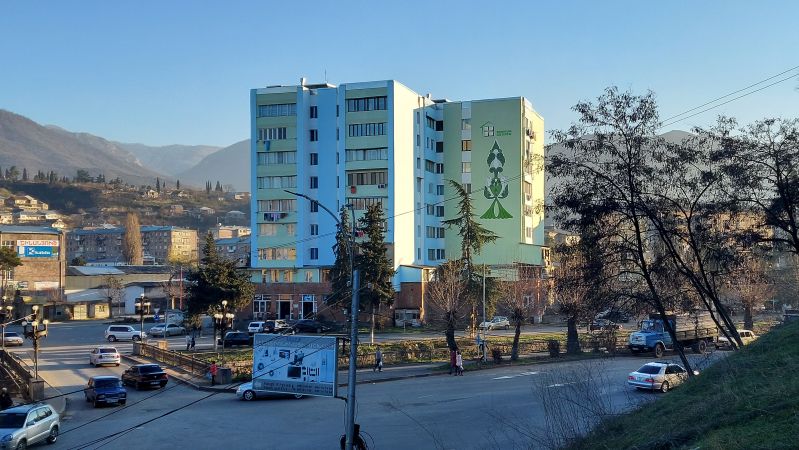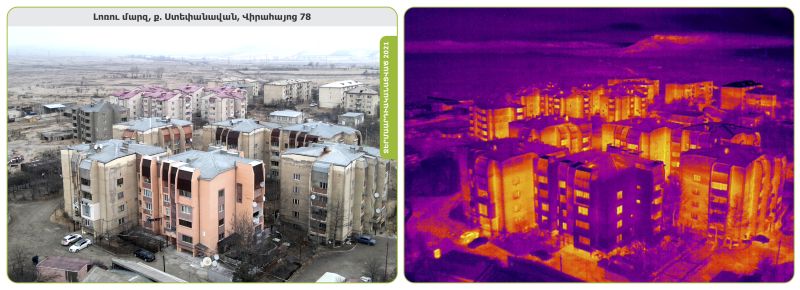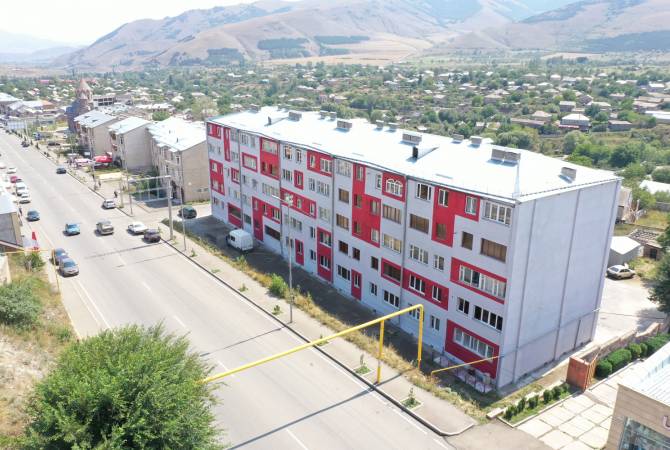Energy efficiency transformation projects in Armenia: reality, impacts, and future expectations
 09:48, 5 April 2022
09:48, 5 April 2022YEREVAN, APRIL 5, ARMENPRESS. In 2017 Green Climate Fund approved a 20 million USD grant for the greenhouse gas emissions reduction project in Armenia by improving buildings' energy efficiency. Later in 2020, history was made when the Armenian government approved buildings’ energy efficiency retrofits as eligible under the state subvention program. Having the Armenian government as a primary partner in this project is a huge advantage for all beneficiaries in public and residential buildings. It improves the living conditions of ordinary people and creates an opportunity for more mutual projects in the future.
UNDP and GCF joint forces with the Armenian government to make a difference in the energy efficiency sector in Armenia, a sector that needs a lot of work and has to be appropriately presented to the people in order to utilize its outcomes. Ordinary people need to understand the short and long-term advantages of transforming their residential communities to become energy efficient. Only then a real change will happen, and it will open the door for a green Armenia that contributes positively to global climate change and can guarantee a better quality of life for its people.

How does it impact climate change?
The project’s direct impact is lowering greenhouse gas emissions and other pollutants from burning fossil fuels for heating. Up to 5.8 million tons of CO2 will be saved over 20 years. It is equivalent to the CO2 emissions from about 630,000 homes’ energy use for one year! Or the CO2 sequestered by around 6,500,000 acres of U.S. forests in one year!
In a country with a cold winter like Armenia, where the temperature could drop to 20-30 degrees below zero, such emissions are not a surprise since individual gas boilers heat most residential properties with a total absence of energy-efficient solutions in the majority of the buildings. We consider addressing global climate change as our responsibility, and we aim to de-risk its effects in Armenia one building at a time. Still, we recognize the reality of our circumstances, and we know it’s impossible to retrofit every single building in the country.
Here comes the indirect impact of our project, which is to lead by example and spread the culture of energy efficiency among Armenian people by all possible means, whether by informative videos, publications, social media platforms, and even energy efficiency passports for the buildings we retrofit. We need to show them the change energy efficiency solutions can make to their lives and to gradually increase their interest in implementing such solutions at their own cost.

What added value does it have for the Armenian economy?
Scaling up the investment in energy efficiency solutions is one of the primary targets of this project. We want to encourage the private investors in Armenia to participate in this domain actively. Our project will gradually create the need for such solutions in the local market; hence supply will emerge to cover the increasing local demand. Sooner or later, it will help support existing workforces, create not temporary but permanent green jobs, bring foreign investments, improve the country’s competency in this field, and eventually fasten our steps towards addressing climate change.
We have witnessed promising signs of interest in local communities throughout the last two years, especially after we finished retrofitting over seventy residential buildings. As we move forward with our project, we’ll motivate more people to take the initiative and join the green energy efficiency movement in Armenia.
Besides that, we can’t ignore the role of energy efficiency solutions in meeting the growing energy demands in Armenia. Energy savings will support the Armenian national economy and increase governmental investments in other fields.
A better life for the Armenian population
Utility bills are always a big problem for the poor people in Armenia, especially the gas bills in the freezing winter and the electricity bills in the hot days of summer. Some families would struggle to maintain their heating or cooling systems running. Besides the climate and economic impacts, we estimate that over 200,000 people in Armenia will benefit from this project.
Residents of rural areas will have a chance of better living conditions for lower utility bills. The more people can save on utilities, the more they can spend in domestic markets to enhance their lives. While researching the selected regions and areas of the project, we found that the most vulnerable households are women-headed, ranging from 15% to 30% of the total beneficiaries. The project will support these women to help them provide a better life for their families. To put that in other words. Warmer residential buildings, lower monthly expenses, and a better lifestyle for the poor Armenian segment of the society.

Eliminating energy poverty
Many families in the rural areas of Armenia have bad economic circumstances. Despite the availability of energy solutions in the country like gas and electricity, they can’t use it consistently due to expensive utility bills. One of our project’s goals is to implement a sustainable solution to reasonably reduce the utility bills for these families by retrofitting residential buildings. Energy-efficient buildings consume fewer energy resources and provide better living conditions. So far, our effort has resulted in a substantial improvement in terms of cost savings in the buildings we've already retrofitted.
As a result of the energy efficiency retrofits we carried out at some residential communities, the total energy consumption decreased 2.4 to 4.2 times resulting in a reduction in greenhouse gas emissions and 20-60% savings in heating and cooling costs. Furthermore, the market value of apartments in retrofitted buildings has grown by 10-15%.
Achieving energy independence
Although the Project won't result in achieving total energy independence country-wise, it would assist communities in achieving partial energy independence. This step is only the beginning, and since we know it's impossible to retrofit all buildings in Armenia, and we can't implement energy efficiency solutions inside every apartment, our long-term plan, as demonstrated above, is to spread the energy efficiency culture across the country. We want local communities to take responsibility and engage in the energy efficiency movement on their own and look for solutions to become energy independent.

Practical steps towards an energy-efficient Armenia
The Project focuses on existing public and residential buildings, especially the old ’60s-’80s buildings that lack any signs of energy efficiency. Full and partial thermal retrofit plans were harmonized with improved building codes and standards of the Republic of Armenia and implemented in several buildings. Windows and doors on staircases were replaced, vestibule entrances were built, roofs and external walls were completely insulated, basic fire safety measures were addressed, and modern LED lighting systems were installed.
UNDP assisted in doing quality control on the supplied materials, goods, and construction. Our work is still in progress to finish transforming 110 buildings in 14 communities into energy-efficient facilities by 2022.

Project uniqueness and requirements
There are many energy-efficiency projects worldwide, but the uniqueness in this one was convincing the Armenian government to take part as a primary co-financing partner to retrofit buildings for the better future of Armenia and its people.
Having the government as a primary co-funding partner in this project was a significant step forward in the international collaboration with Armenian official bodies regarding climate change. However, the GCF, the UNDP, and the Armenian government can’t fund the whole multi-building development project independently. The need for third-party funding partners is essential to keep pushing in the right direction. Only by that will our work result in a sustainable development model to achieve the energy efficiency transformation in Armenia.
International communities’ role in supporting the project is very noticeable, and it plays a crucial role in diversifying the financial sources required for the continuity of the project. We need to keep funds flowing to constantly push our project forward as we don’t want to limit our accomplishment to 110 buildings, but we need to do more so we can keep spreading energy efficiency awareness.
We want to spread the energy efficiency culture and scale up the energy-efficient retrofit of buildings; even with a different funding plan, we want this progress to continue by collaborating with national and international parties for its success and sustainability of achieved partnership with the communities.

Conclusion
In light of surrounding circumstances and the current situation, the need for having an energy efficiency transformation in Armenia is vital and growing. As it would not only contribute to the life of the Armenian people, it would also join the international efforts to address the global climate change issues in the building sector. We've already come a long way in our endeavor, but there is a lot of work to do in the future to ensure the stability of our project and the sustainability of its results in the long term, and that requires the international support of all concerned parties.
The Armenia government has been dynamic and open to collaboration in this regard, which alone is a big step towards an energy efficiency change in the country and a chance we need to grasp. We need to take the opportunity and combine all efforts to keep the project moving forward towards a green Armenia.
Diana Harutyunyan
Climate Change Programme Coordinator UNDP




















